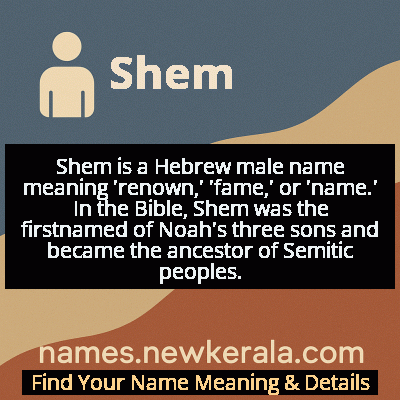Shem Name Meaning & Details
Origin, Popularity, Numerology Analysis & Name Meaning of Shem
Discover the origin, meaning, and cultural significance of the name SHEM. Delve into its historical roots and explore the lasting impact it has had on communities and traditions.
Name
Shem
Gender
Male
Origin
Hebrew
Lucky Number
9
Meaning of the Name - Shem
Shem is a Hebrew male name meaning 'renown,' 'fame,' or 'name.' In the Bible, Shem was the firstnamed of Noah's three sons and became the ancestor of Semitic peoples.
Shem - Complete Numerology Analysis
Your Numerology Number
Based on Pythagorean Numerology System
Ruling Planet
Mars
Positive Nature
Generous, passionate, energetic, and humanitarian.
Negative Traits
Impulsive, impatient, moody, and can be overly emotional.
Lucky Colours
Red, maroon, scarlet.
Lucky Days
Tuesday.
Lucky Stones
Red coral, garnet.
Harmony Numbers
1, 2, 3, 6.
Best Suited Professions
Military, sports, philanthropy, leadership roles.
What People Like About You
Courage, energy, leadership, generosity.
Famous People Named Shem
Shem (Biblical)
Patriarch
Eldest son of Noah, ancestor of Semitic peoples
Shem Tov ben Joseph ibn Falaquera
Philosopher and Poet
Medieval Jewish philosopher and translator of Arabic works
Shem Tov ben Isaac Ardutiel
Poet and Translator
Spanish Jewish writer known for philosophical poetry
Shem Tov ben Abraham ibn Gaon
Rabbi and Kabbalist
Prominent Talmudist and commentator on Maimonides
Name Variations & International Equivalents
Click on blue names to explore their detailed meanings. Gray names with will be available soon.
Cultural & Historical Significance
In addition to his biblical role, Shem appears in various midrashic and Talmudic traditions as a teacher of Torah and a righteous leader. Islamic tradition also honors Shem (Sam in Arabic) as a prophet and righteous figure. The cultural impact extends to linguistics, where the Semitic language family—including Hebrew, Arabic, Aramaic, and others—bears his name. This connection makes Shem not just a personal name but a cultural and linguistic category that has shaped academic and historical understanding of Middle Eastern civilizations for centuries.
Extended Personality Analysis
Individuals named Shem are often perceived as traditional, wise, and deeply connected to their heritage. They tend to exhibit strong leadership qualities and a natural inclination toward preserving family traditions and cultural values. The biblical association with being the firstborn son of Noah suggests characteristics of responsibility, reliability, and a protective nature toward those in their care. Many Shems demonstrate intellectual curiosity and philosophical depth, often showing interest in spiritual matters and historical continuity. They typically possess a quiet dignity and moral compass that guides their decisions, making them respected figures in their communities.
While sometimes reserved, they form deep, lasting relationships and are known for their loyalty and commitment to principles they hold dear. The name's meaning of 'renown' or 'name' suggests that individuals bearing this name often have a strong sense of identity and purpose. They may feel a connection to legacy and how they will be remembered, driving them to achieve meaningful accomplishments. Their approach to life tends to be thoughtful and deliberate, with an appreciation for history and tradition balanced with a forward-looking perspective. The combination of these traits often results in individuals who serve as pillars of their communities and families.
Modern Usage & Popularity
In contemporary times, Shem remains a relatively uncommon but meaningful choice, primarily within Jewish communities and among those with strong biblical interests. The name has maintained steady but low usage, often chosen by parents seeking a name with deep historical and religious significance. While not appearing on popular baby name charts in most English-speaking countries, it enjoys periodic revivals when biblical names trend. In Israel, the name is more recognized due to its Hebrew origins and biblical importance. Modern usage often reflects a desire to honor ancestral traditions while selecting a distinctive name that stands apart from more common biblical choices like Noah or Jacob. The name's simplicity and strong consonant sound make it appealing to parents looking for short, memorable names with substantial meaning.
Symbolic & Spiritual Meanings
Symbolically, Shem represents ancestral legacy, cultural continuity, and the preservation of tradition across generations. The name embodies the concept of 'renown' not merely as personal fame but as the enduring reputation of a lineage or people. It symbolizes the bridge between ancient wisdom and contemporary life, carrying the weight of historical responsibility. In metaphorical terms, Shem represents the foundation upon which civilizations are built—the patriarchal strength that ensures cultural and religious traditions survive through time. The name also symbolizes the idea of naming and identity itself, as the Hebrew word 'shem' literally means 'name,' representing how identities and reputations are constructed and maintained across generations. This dual symbolism of both the individual and the collective makes Shem a name rich with meaning about personal identity within the context of historical continuity.

